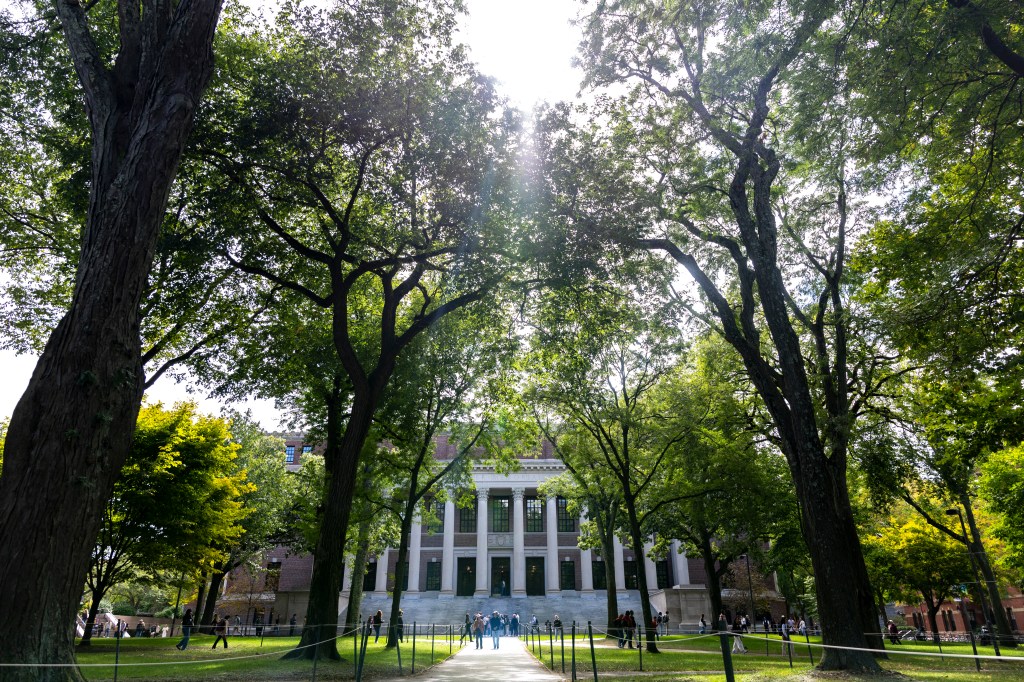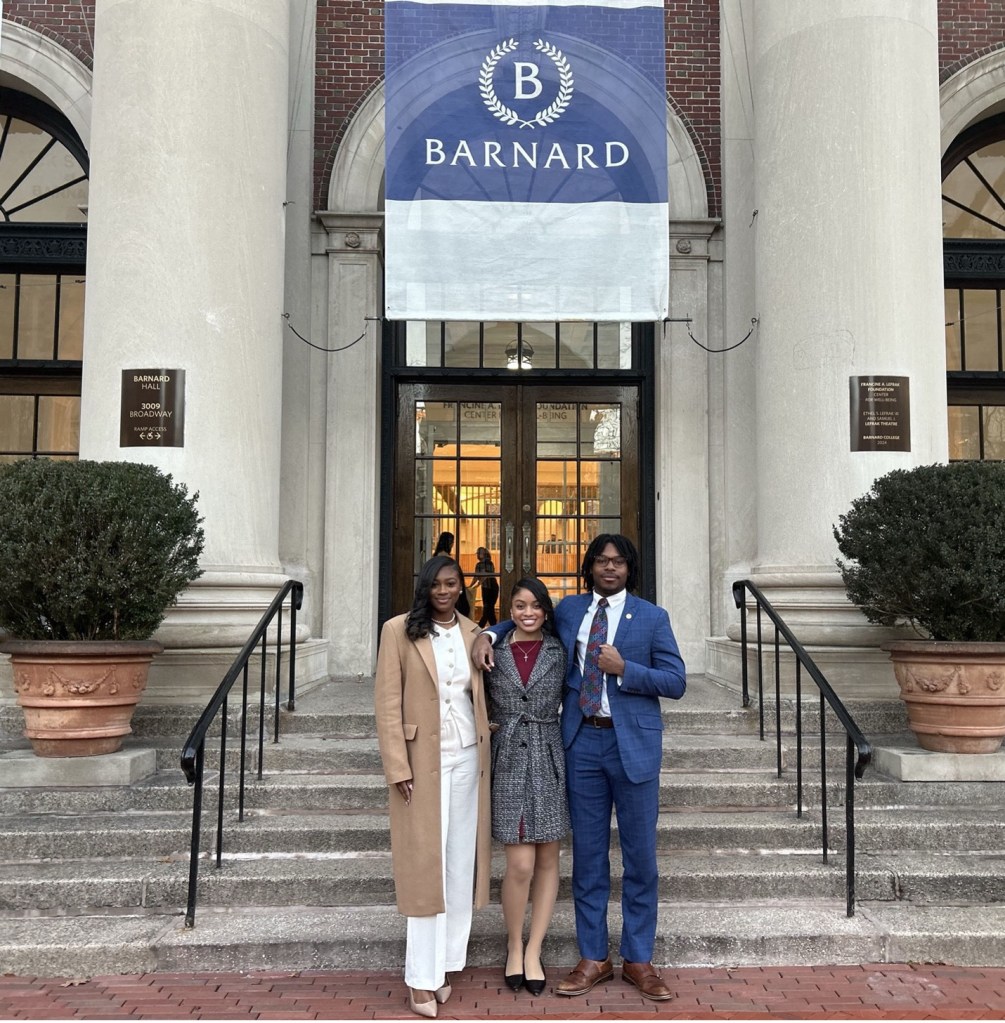Harvard & the Legacy of Slavery Initiative Welcomes Second Cohort

By Julita Bailey-Vasco | June 12, 2025
The Du Bois Scholars Program will welcome its second cohort of fellows this month while also expanding its partnerships and support from the Center for Astrophysics and the Harvard Business School’s Program for Research in Markets and Organizations.
The Du Bois Scholars Program creates opportunities for students from R1, R2, and research-focused historically Black colleges and universities to experience a unique and expansive summer research program with Harvard faculty mentors. The program is part of the Harvard Summer Undergraduate Research Village at Harvard College and is supported by Harvard & the Legacy of Slavery Initiative and Harvard College.
Five of this year’s 35 fellows have been matched with the Center for Astrophysics. This new partnership gives the next generation of astrophysicists the opportunity to actively participate in research under the direct supervision of prominent scientists in the field. “The engagement of undergraduates in research is an exciting aspect of modern astronomy,” said Daniel Eisenstein, Paul C. Mangelsdorf Professor of Astronomy and chair of the department of astronomy. “We are excited to welcome participants of the Du Bois Scholars Program to the Center for Astrophysics this summer.”
Two fellows have been matched with the Harvard Business School’s Program for Research in Markets and Organizations. The partnership allows the fellows to build community in business and related fields.
The Du Bois Scholars Program, which is led by Shahara C. Jackson, Director of HBCU Initiatives for Harvard & the Legacy of Slavery Initiative, builds a network of fellows from diverse HBCUs and enhances their leadership, presentation, critical thinking techniques, and more, strengthening their foundation as student researchers. Through faculty mentorship, fellows gain access to a learning environment that fosters intellectual growth and personal development. At the end of the program, fellows write abstracts on their research and present their findings in front of their peers, family, friends, and mentors. They leave the program with a strengthened approach to their area of study, community-based collaboration, and a heightened desire for curiosity and exploration. They participate in a variety of professional development opportunities with the ability to continue growing these skills into the following academic year.
“The Du Bois Scholars Program advances one of the Initiative’s three strategic priorities – deepening our partnerships with HBCUs. The program’s impact occurs in the relationships built between its fellows and Harvard faculty — collaborations that drive transformative research,” said Sara Bleich, vice provost for special projects, Harvard University, and leader of the H&LS Initiative. “We’re thrilled to welcome our second cohort of fellows, including seven returning fellows, to Harvard this summer.”
Tre’von Henderson, a rising senior studying sociology and education at Morehouse College and an incoming fellow of cohort two said, “This program is an opportunity to advocate for the unheard in academia. As I enter, I’m committed to exemplifying what ‘never choosing good when great is available’ means.”
Last year’s cohort continues advancements
In its first year, 20 Du Bois Fellows contributed to research in 20 different projects, ranging from topics as diverse as clinical trial recruitment to resisting scientific racism.
Kai Dickerson, a returning fellow and recent graduate of Spelman College with a degree in psychology and pre-med, leveraged the leadership skills she gained in the program to organize a small group of fellows from cohort one to participate in the Zora Neale Hurston Summit at Barnard College in February 2025. Dickerson, Ellison Richardson, a recent graduate of Howard University who studied political science and Afro-American studies, and Talia Ford, a returning fellow and rising senior at Spelman College studying health sciences and pre-med, presented “I Have the Nerve to Walk My Own Way: Zora Neale Hurston in Contrast to other Harlem Renaissance Contemporaries.”

“Attendees were able to grapple with the different approaches that W.E.B. Du Bois, Langston Hughes, and Zora Neale Hurston used when addressing the intersection of art, civil rights, and politicization. These approaches were foundational to Black identity and were a precursor to the Civil Rights Movement. Our session highlighted the importance of collective contribution to Black progression,” Ford said.
Part of an enduring commitment
The Du Bois Scholars Program is an opportunity for HBCU students and Harvard faculty to create life-long bonds. This is where groundbreaking ideas are formed.
Evelynn Hammonds
The Du Bois Scholars Program launched in 2024 as part of the H&LS Initiative’s ongoing commitment to developing enduring partnerships with HBCUs as recommended in the Report of the Presidential Committee on Harvard & the Legacy of Slavery.
The Report acknowledges that Harvard, like many other institutions of higher learning, benefits from the scholarship of HBCU alumni. HBCUs have been crucial in producing professionals, leaders, and changemakers who make significant contributions to many aspects of American society.
“The Du Bois Scholars Program is an opportunity for HBCU students and Harvard faculty to create life-long bonds” said Evelynn Hammonds, an advisor of the H&LS Initiative and the Barbara Gutmann Rosenkrantz Professor of the History of Science and Professor of African and African American Studies. “This is where groundbreaking ideas are formed.”
